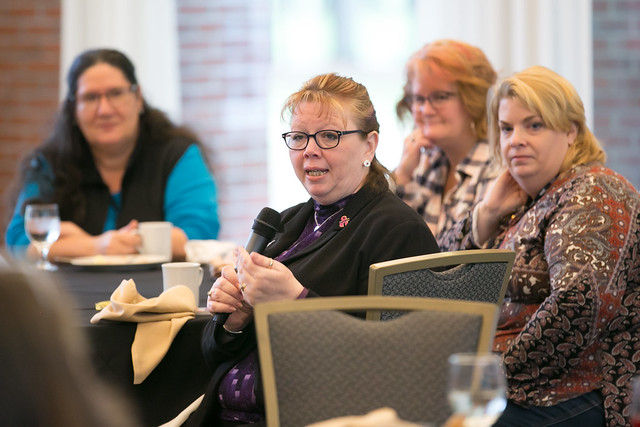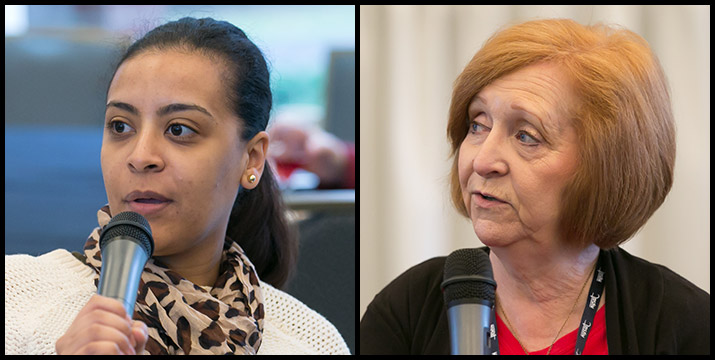From protracted contract negotiations to exploitation of adjunct faculty, union activists at NYSUT’s Community College Conference embraced one powerful word to take on a number of looming challenges: Solidarity.
“In this past year — particularly for several of our higher education locals — solidarity has been more important than ever,” NYSUT Vice President Catalina Fortino told more than 135 community college activists at the conference last weekend. “In the coming months, as we face new challenges, let us remember that at the very heart of the union movement is the belief that we don’t triumph alone.”
Fortino said that kind of strong solidarity was clearly evident when members of the Professional Educators of Corning Community College, who are fighting to reach an agreement over salary, staffing and student services, were joined at a recent rally by community college colleagues from Long Island, Erie County and Broome County.
“They rallied side by side with PECC members, letting them know they weren’t alone in their contract struggles,” Fortino said.
Similarly, she said unionists were there for each other during the six long years that members of the United College Employees of Fashion Institute of Technology and the Professional Staff Congress/CUNY, fought for fair contracts.
PHOTO GALLERY

“By making our collective voices heard — through letters, faxes, phone calls and emails to lawmakers and through shows of support at rallies and other actions, we helped bolster the bargaining teams as they worked to reach consensus on agreements that sometimes, no doubt, felt out of reach,” Fortino said. “Congratulations to both of these locals for their great achievements.”
Higher education unionists also supported their brothers and sisters of the Long Island University Faculty Federation earlier this fall, when the union won a contract extension in the wake of an unfair, employer-instigated lock-out. “Yes, this past year we’ve had some really hard times,” Fortino said. “But we’ve always had each other’s backs in times of trouble.”
Fortino said it’s only fitting that UCE-FIT members graciously donated hundreds of “Contract Now” lapel buttons to their union brothers and sisters who are still bargaining at Corning Community College. “Your negotiations are finished — but you understand just how much outside support is appreciated during tough bargaining talks,” she said. “We do our union work together, in solidarity — that has always been and always will be our strength.”
Continuing the solidarity theme, NYSUT Executive Vice President Andy Pallotta thanked activists for stepping up for political action activities around the state — making phone calls, knocking on doors and registering people to vote.
“We can make a difference in every Senate and Assembly race in this state,” Pallotta said, noting that 90 percent of NYSUT members are registered to vote. “We had tremendous success with our ‘Pledge to Vote’ campaign — now we have to make sure everybody actually goes out and votes.”
Keynote speaker John McDonald, an American Federation of Teachers vice president and longtime president of the Henry Ford Community College Federation of Teachers in Michigan, urged community college activists to build community coalitions and a sense of unionism to beat back the corporatization of higher education.
He said the exploitation of part-time adjunct faculty used to be a “dirty little secret,” but it’s festered to the point where it’s become a “bigly” issue. To engage more higher education members in unionism, McDonald suggested shifting the mindset. “They need to realize they’re not just academicians and professors — they’re public employees … and the ultimate root of all evil is inaction.”
Building solidarity and expanding collaboration were common themes throughout many of the workshops at the three-day conference. Activists shared collective bargaining agreement language on issues like online learning, hybrid courses and job security. Other sessions centered on community college financing; available member benefit programs; and improving internal and external communications.
At a legal update session, local leaders heard the latest on noteworthy cases involving community college faculty, including a disciplinary case where the union successfully challenged the two-week unpaid suspension of an Orange County faculty member. The union successfully argued that the college had not followed its contractual progressive disciplinary process when it accused the member of a slew of charges including putting her feet up on the desk and failing to put her email address on her syllabus.
“If you don’t have progressive discipline in your contract, get it!” said Orange County Community College Faculty Association President Kathleen Malia.
At a special session for adjuncts, members discussed job security issues; eligibility for public service loan forgiveness; applying for unemployment and the potential for joining the state retirement system.
“There are a lot of issues for adjuncts, but the most important ones are salary and the guarantee of a job,” said Doug Cody, who is a chemistry adjunct at Suffolk Community College, Nassau Community College and SUNY Farmingdale.
Participants brainstormed ways to increase pay for adjuncts, including proposals to pay a flat $5,000-$7,000 per course. Jeff Zeller, of Rockland Community College Adjunct FA, explained how his contract provides some additional pay and benefits for adjuncts with 10 years of service.
On the issue of engaging more part-time faculty in union activities, Cody said many adjuncts literally don’t have time. “They’re running from one job to another, grading exams, preparing lectures,” Cody said. “I’m one of those so-called ‘road scholars’ … I’m on three faculties. And I tell you, when I go home after this conference, I have 120 papers to grade.”
There were lots of knowing nods around the room.
First-timers share 'union moments'

Ivana Cepeda (left) and Ina Casali. Photos by Marty Kerins, Jr.
The first-timers had a breakfast session where they talked about how they got involved in the union.
Ivana Cepada explained her "union moment" came when she was was a waitress at Yankee stadium. After sweating through the hot summer months wearing the warm year-round uniform, she worked through her union UNITE-HERE Local 100 to demand summer attire. Not only did she help force the Yankees to provide cotton polo shirts, she went on to become a shop steward and a member of the negotiating team. "For me that was the catalyst, I saw what you can do through the union to improve working conditions." Now a media relations assistant at FIT, she immediately stepped up to get involved in her union, FIT-UCE. She said NYSUT's Community College Conference was proving to be very informative and a great place to network with other higher education unionists.
Ina Casali, an adjunct writing professor who has worked at Suffolk Community College more than 25 years, said she recently got involved in her union to advocate for adjunct rights. "There's a lot of misinformation out there. I tell my colleagues never say you're just an adjunct. You have a vote in your union. If you have an issue, say something to your rep." Last spring Ina was elected the faculty associations's executive council adjunct rep. "My mission is to let adjuncts know the union really does care and is doing positive things for you." As an example, she said adjuncts at Suffolk used to have to wait two months to get their first paycheck. "Now thanks to the union, we got our first paycheck in about a month," she said. "Slowly, we're making progress."